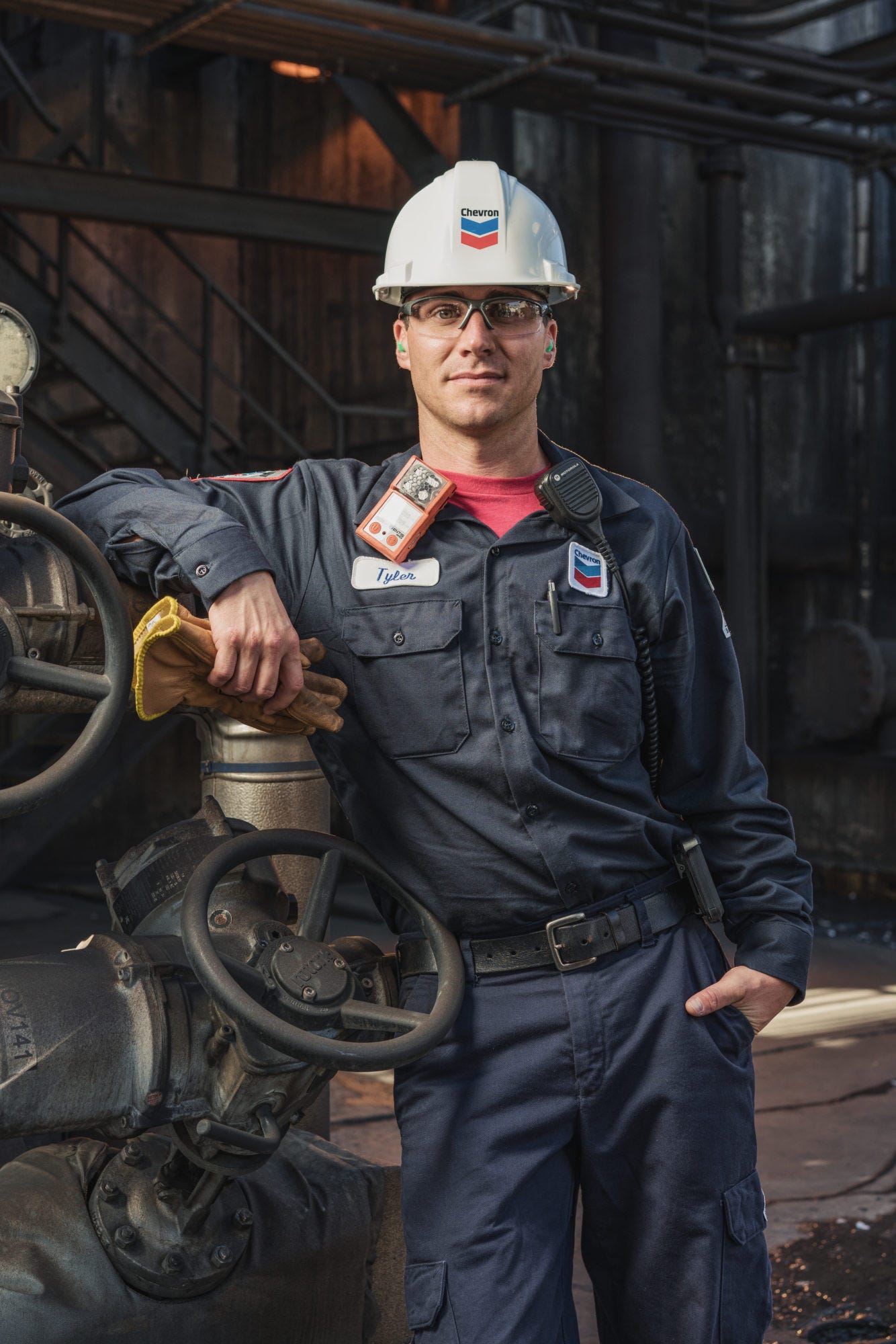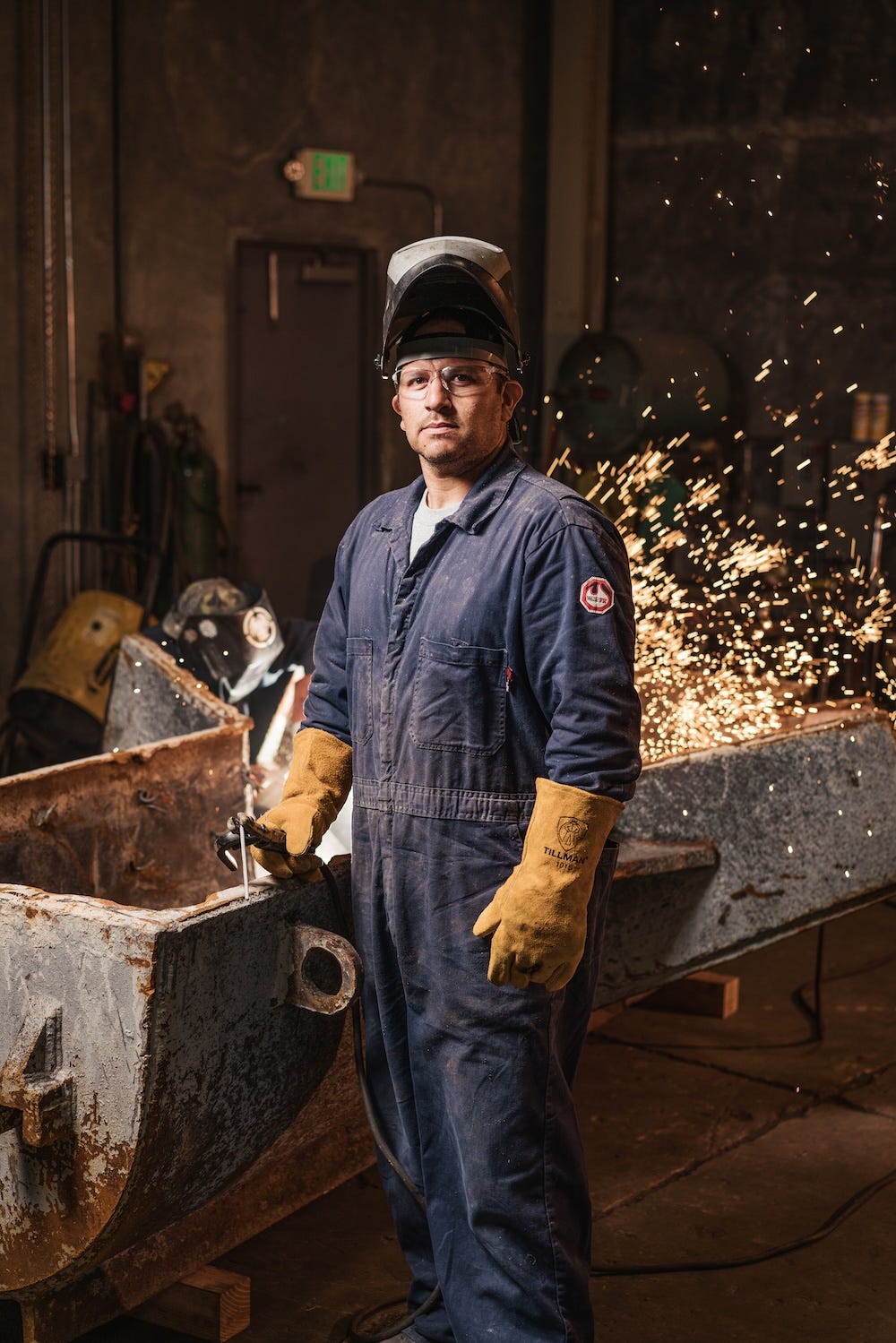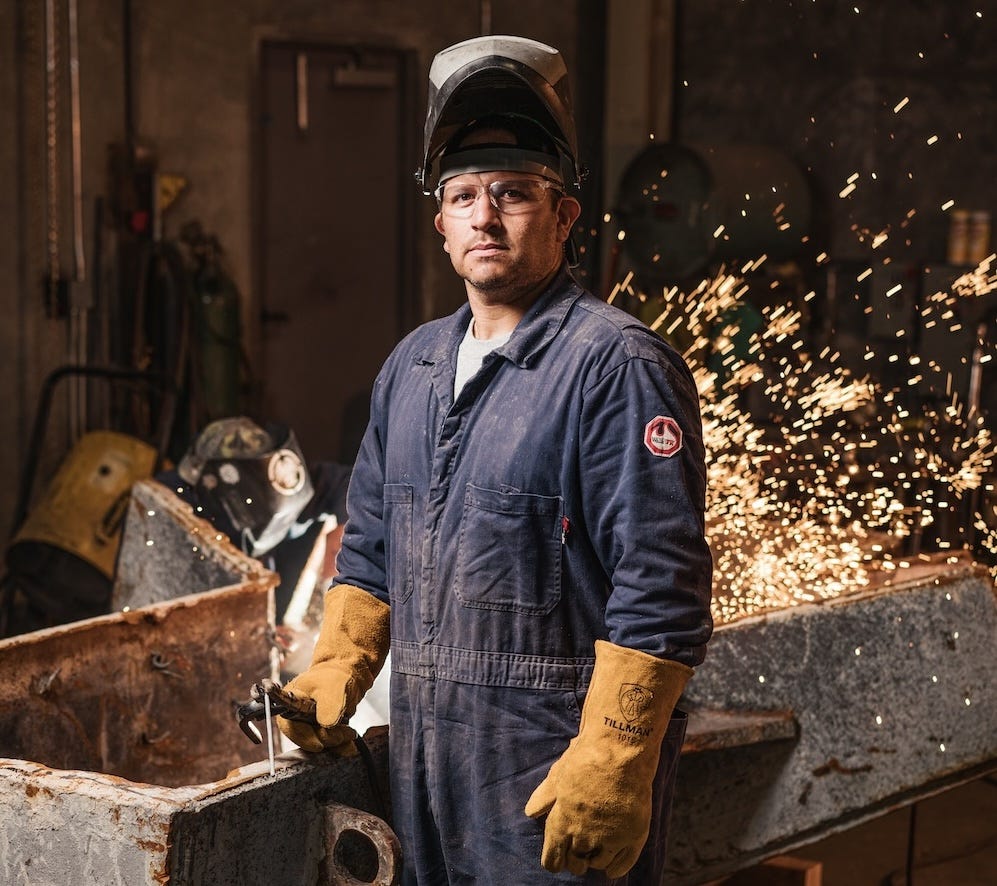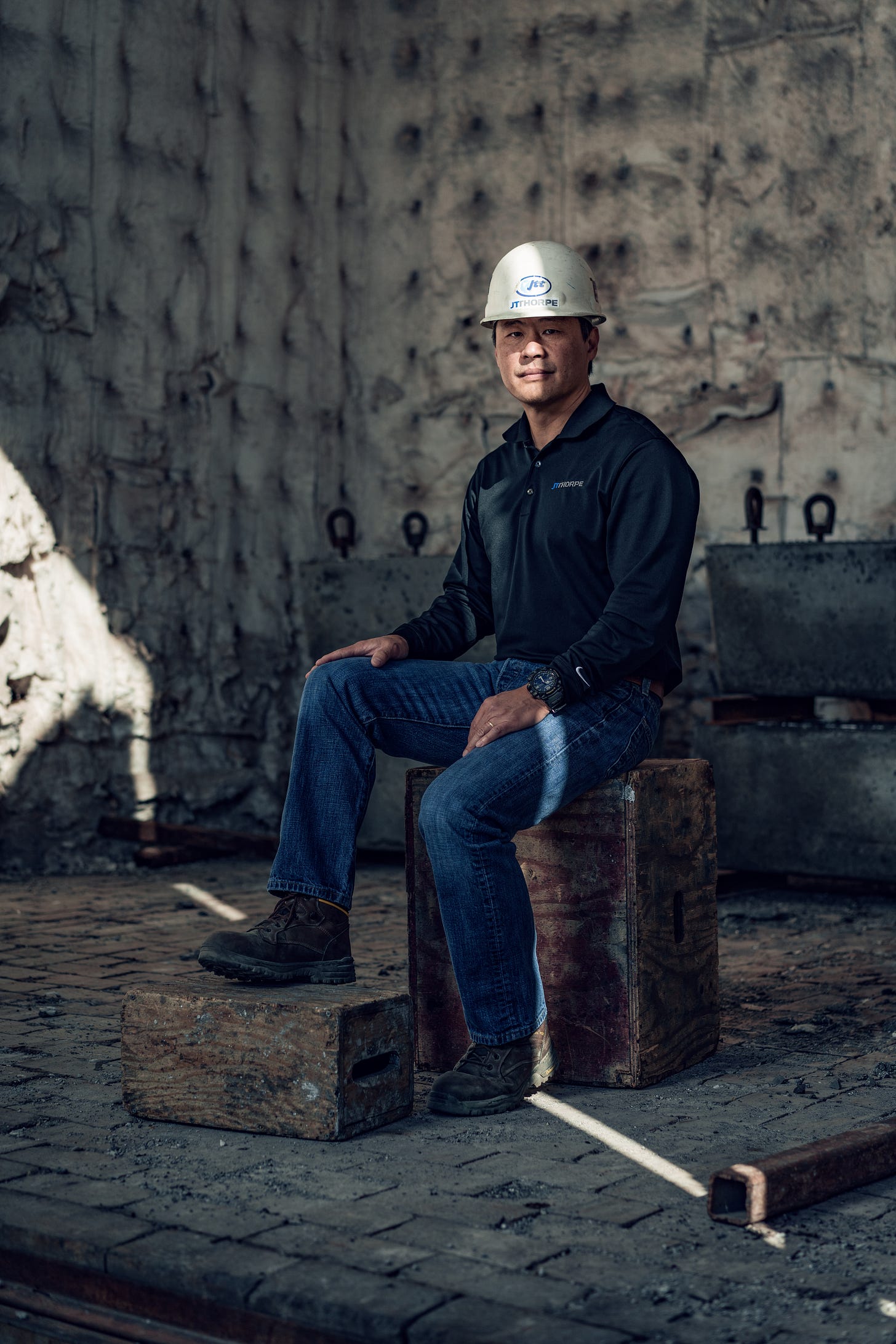Blue-collar jobs might be the best jobs
Things have changed since your grandpa worked the mines.
There is a story I’ve heard time and time again: It’s about a millennial employee who gets a job in tech, struggles to find meaning in that job despite the beanbag chairs and the unlimited PTO, decides to get another job in tech―this one with the hope of more meaning, more passion. Press repeat.
I think, because we spend so much time in our careers, we hope they will somehow soothe our existential angst. Instead, we find them lacking the sort of substance they promise us, and, in an attempt to find it, we job hop, searching for meaning in our careers the way ascetics do in caves. Perhaps now I will be fulfilled, we think. Perhaps now I will.
Whether or not our careers are our best source of fulfillment is one thing, but I have a theory that some industries are more conducive to it than others. I’m garnering this theory from the fact that I hear this story play out so often in tech, and almost never in heavy industry. I should know: my husband has worked in the refractory industry for the last 15 years and his father spent his career operating a nuclear reactor.
Despite the fact that tech jobs are notorious for their generous vacation policies and in-house masseuses, employees in that field change jobs every two years on average. Industrial work, however, requires the occasional 80-hour workweek and various holidays spent on call, yet employees stick around for the duration of their careers. My husband and his dad both love their jobs, so do their coworkers.
I have a theory about why that is.
“I can’t get no satisfaction”
Technology is ethereal. You might have a feeling that something’s going on behind the scenes, but you can’t see it or touch it. Similarly, the “product” sold by most tech companies is immaterial. You might be able to use it on a phone or computer, it might make work more convenient or life a little easier, but for the most part, it only physically exists on a server out in the ether.
That’s exactly the sort of thing that could spur on an existential crisis. “Those of us who sit in an office often feel a lack of connection to the material world, a sense of loss, and find it difficult to say exactly what we do all day,” says Matthew Crawford in his book, Shop Class As Soulcraft: An Inquiry Into The Value of Work.
When we can see the work we’ve done, when we can actually feel the heat of a blast furnace singing the hairs off our skin, we are more invested in what we’re doing. “You’re making something,” says Saskia Duyvesteyn, chief R&D advisor at Rio Tinto Kennecott. “And I think sometimes that’s missing from other jobs. We are actually making a product in the end, and that’s one of the things that’s different about what we do than a lot of other industries.”
Bhavana Mukunda is an electrical engineer at the copper mine, and she actually considered a job in tech before deciding to study power systems instead. “In the tech industries, you have your code, you wrote your code, it may be used, it may not be used, but [at Kennecott], the challenge is there, it’s solved, and I see the effects of it… I got to see a plant go back online because of what I did, which is pretty cool.”

Now a general foreman, Juan Aguirre got his start at JT Thorpe & Son laying brick, pouring concrete, and welding metal. “There are jobs that we’ve done, where you turn around and look at it like, ‘man, let me take a picture because I don’t think my wife would believe that I did that,’” he says.
On one project: “We finished the day at three in the morning and we were really tired. But then we turned around and looked at the end product, and I was like, I can’t believe we did that… It looks like something you would see in a cathedral, just really intricate and beautiful.”
“Workin’ nine to five”
By comparison, office jobs can get a little monotonous. The sitting at your desk until lunch. The sitting at your desk until five. Sure, there are important things that get done during that time—emails get sent, meetings take place, conference calls get dialed into—but most of what is done in a day at a desk job can’t objectively be called “hard.”
As a friend said to me recently after work: “The monotony of being in a box, staring at a screen, and talking to humans all day is exhausting.”
After work, you might feel tired, but not physically―you haven’t really done anything to deserve that―more just mentally drained from the tedium. “I was always tired,” Crawford said of his job at a Washington think tank, “and honestly could not see the rationale for my being paid at all―what tangible goods or useful services was I providing to anyone?”
Industrial jobs are just the opposite. “When I came in, I was in shock,” says Aguirre of his first day on the job. “I was in this big cement plant, and I see all these guys with wheelbarrows and shovels, then I have to go in with a 45-pound jackhammer to drop this concrete wall down. It’s hard work you know. I went in there and hammered for about 10 minutes and was like, ‘man this sucks!’”
And the conditions aren’t always ideal. “We’re out there in anything,” says Tyler Raleigh of his work as an operator at Chevron. “Rain, snow, nights, days, holidays, weekends. So it can be great, and it can be not that awesome, because it’s raining but you gotta do what you gotta do to keep the process going.” At one point Raleigh jokes about getting his steps in―turns out operators get a lot. One reported getting 36,000 steps in one 12-hour shift.
But perhaps, hard work is exactly what makes the job so fulfilling. Perhaps when we spend the day casting steel, sweating through thermals and flame-resistant workwear in 2,300-degree heat, it just feels like we’re actually doing something. “I like it, I’m into it,” says Raleigh. “My dad was a white-collar guy, my grandparents were white-collar people, but I don’t mind working. For me, it’s just more fulfilling.”

“She works hard for the money”
The proof is in the pudding. “I’ve never worked anywhere that had quite the longevity we have here,” says Mitch Pearson, manager of learning and development at Rio Tinto Kennecott. “We have a very large portion of people who have been here 20 to 30 years.”
This is the rule, I’m told, not the exception. “When people can see that they’re actually making something or doing something, that becomes a draw for them,” says Duyvesteyn. “And once you see the passion of mining, and you love it, you don’t ever want to leave it… For the most part, when people come here, they stay.”
She’s been with the company for 16 years.

When I ask why, the answer remains the same: the work is hard, the result is tangible, and you get paid really, really well.
“Let’s just say this: blue-collar work pays,” says Raleigh. “I look at people my age right now who did end up going to college and doing all of that—seeing where I’m at and where they’re at, it’s like I’m five years ahead. So yeah, I feel awesome. I mean my 401k looks pretty good.”
Even if you start at the bottom, without any experience, you’ll earn far more than minimum wage. An entry-level laborer at JT Thorpe & Son makes more than $21 an hour. A journeyman bricklayer makes $28. With overtime, both roles can make upwards of $70,000 a year―without a college education. Truck drivers at Rio Tinto Kennecott make between $20 and $30 an hour, receive 401k matching, and have the opportunity to earn quarterly bonuses.
“We need fitters and welders. We need operators and machinists. We need mechanics. There’s a huge demand for tradespeople,” says Raleigh. “Everyone thinks that you need to go to college because that’s the roadmap you should be following if you want to be successful. But then you see that your buddy who didn’t go to college, who’s a welder, is making fucking good money.”
And those are just the entry-level jobs. All careers, whether bricklayer or truck driver, receive on-the-job training and have clear paths for career advancement. Supervisors at JT Thorpe make close to six figures. Much more if they go on to become foreman.
And by the way, the time off is really, really good.
In addition to paid vacation days, one of the benefits of shift work is the ability to bank days: Work a few hard days on, have a week off. “You can go see a movie and nobody else is there. Or go do things with kids during the summertime in the middle of the week. Or just go on vacation without having to take vacation,” says Raleigh.
Chris Golding, a safety specialist at Chevron says swing shifts helped her raise her children as a single mom, giving her time off mid-week that she could devote to family, or ride her horses. Aguirre says he gets four months off a year, requesting to work larger chunks at a time, so he can have full months off from work when he wants them.
And because they work so hard when they’re on, they develop lifelong friendships with their coworkers that office workers can only dream about. “We just get so close to where we actually care for each other,” says Aguirre. “We call, you know, on the weekends, ‘Hey, man, how is the family? How’s your son? How’s he doing?’ Some of my closest friends work for the company.”

“Never gonna give you up”
Not only is the work more fulfilling, but the stigma surrounding blue-collar work just isn’t true anymore. It’s not all hard hats and PPEs. Well, it is, but you might be surprised to learn that these companies are also quite tech-savvy themselves.
Kennecott employees aren’t going to the mine with a pick and shovel, they’re operating technologically advanced pieces of equipment that use artificial intelligence and machine learning to predict and optimize mining operations. Chevron uses laser scanning technology to create complete CAD drawings of the refinery.
“It’s basically a computer that shoots out laser beams and then it takes them back and puts them in the computer,” says Justin Eggli, piping designer at Chevron. “So instead of taking out a tape measure, it’s all in the computer.”

They also offer many of the same benefits touted by tech companies. Rio Tinto Kennecott has electric vehicle charging stations available for their employees and has mothers’ rooms at their plants. Chevron’s employee resource groups have set up a booth at Utah’s PRIDE parade, and Golding even moonlights as a Reiki master, providing meditation classes for her coworkers on-site as part of the company’s Women’s Employee Network.
And the gender gap is rapidly closing. Even Golding, who has worked in the industry for more than 30 years, was confused why I would ask her what it was like working as an industrial welder as a woman. “Once you proved yourself that you were there to do the job, it didn’t matter,” she says. “And I wouldn’t accept anything less.”
“We’ve historically been a male-dominated industry,” says Pearson of Rio Tinto Kennecott. “That’s why we started the studies a few years back to say, ‘you know, what is it that women do or don’t like about what we’re doing?’ and ‘what are we doing to change this?’” The company now offers 18 weeks of paid parental leave to both men and women who are the primary caregiver for their child.
That millennial I was talking about? The one who just can’t find satisfaction in his tech job? At some point, he might take up a side hobby as a custom furniture builder. He’ll make $30,000 a year selling kitchen tables to his friends, and he’ll still have all that school debt and that fancy job to contend with. But he’ll be working with his hands, he’ll create a tangible product, and he’ll finally feel a sense of meaning in his life.
If only someone could have told him there was another way. That blue-collar jobs are desirable, well-paying, fulfilling, and provide the most important and necessary work for humanity.
That they might just be the best jobs in the world!
Thank you so much for reading,
Postscript: This piece was inspired by my husband, Garret Griffin, who works in the refractory industry—the bricks you see lining a lot of the processes in the background of these pictures. A lot of the people photographed in this piece are his customers.
Having been around this industry for so long, I’ve had the opportunity to tour these plants and meet all of the people they work with and I’ve frequently thought: well you guys love your jobs more than anyone I know! I hope you enjoyed this portrait from the inside.
This piece was originally published for Utah Business. Photographs in this piece were shot by Cam McCleod.





As former blue-collar worker, I can honestly say, blue-collar work isn't all roses. Depending on the job. But manual labor is definitely satisfying and good exercise. And you get a sense of accomplishment. I knew as a teen I didn't want a "desk job" and didn't go to college. (My father worked in a GM factory his whole career.) I went to work at an airline at 19, and worked for the airlines for 27 years loading and unloading airplanes. In all kinds of weather, include the icy-cold Michigan winters. On weekends and holidays, often on bad shifts (5:00am-1:00pm or 3:00pm-11:00pm.) But I enjoyed the work. It was physical, challenging, and different every day.
When a flight came in, we had a set time to complete our job. Unloading the plane, loading the plane, making sure the balance was correct (you don't a nose-heavy or tail-heavy airplane. Especially flying overseas) and entering the cargo load into a computer. If they hadn't contracted out my job, I would have stayed until retirement.
I liked most of the people I worked with, because I took worse days off to get on crews with hard workers and good people. But there were plenty of people who fit the rough, negative, blue-collar stereo-type. I saw sexism in action. When women took the job, they were shunned by many of the guys for whatever reason (lack of strength, "it's man's work", they had to behave better around women, etc.) I frequently volunteered to take the women on my crew because they invariably tried harder and were good workers.
The pay wasn't as good as a skilled trade like a plumber or mechanic. My peak year was $60,000 (due to a lot of overtime.) But it wasn't bad for an "unskilled" trade. And I got to fly for free. The best benefit.
Doing a job you enjoy for less money is better than doing a job you hate for more money. In my opinion. By the way, after I lost my airline job, I started teaching guitar for a living. It also doesn't pay that well. But it beats working a "desk job." 🤣
Wonderful piece. When I was working toward becoming a writer, I took up odd jobs as a handyman around LA. It was a wonderful counterpoint to the heady work I am more suited to doing.
I learned something important. Sometimes, it was hard to fix things. When I was stuck, I would mutter to myself, "there is always a way." And I usually found a way.
That's helpful for anyone to know-- because sometimes when heady ideas don't work out in the real world, we sometimes blame the real world for not being "worthy" of our ideas. But that's backward. The ideas are what's not worthy -- not yet anyway. But the good news is that there is always a way. Keep trying.
Doing embodied work makes you a better person, a better writer, and a better software engineer. No one should feel that any honest work is too "low" for them. It's not.